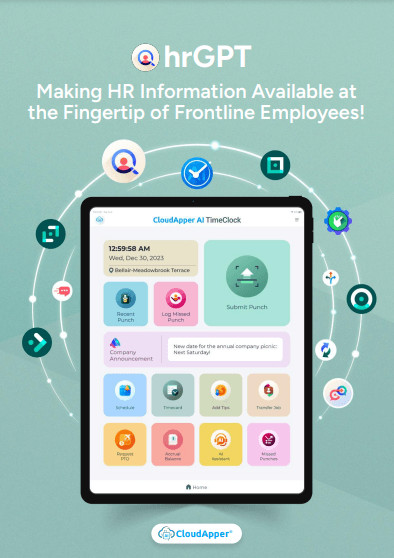Table of Contents
Efficient shift management is crucial for the smooth operation of retail businesses. Effectively scheduling and managing shifts ensures that the right employees are in the right place at the right time, optimizing productivity and customer service. However, manual shift management processes can be time-consuming, prone to errors, and challenging to coordinate. To overcome these challenges, the automation capabilities of hrGPT offer a transformative solution. In this blog, we will explore how hrGPT can revolutionize Shift Management in Retail industry, enhancing operational efficiency and employee satisfaction within UKG solutions.
Importance of Shift Management in Retail
In the world of retail, effective shift management plays a pivotal role. With varying customer demands and peak shopping periods, it is essential to have the right number of staff members available to meet customer needs while maintaining cost efficiency. Accurate and efficient shift management ensures that staffing levels align with customer footfall, minimizes overtime costs, and enables proactive management of breaks and time-off requests. By streamlining shift management processes, retailers can optimize resource allocation, increase employee satisfaction, and deliver a superior customer experience. Shift management plays a crucial role in the success of retail businesses for several reasons. Let’s explore why it is important:
Optimal Staffing
Effective shift management ensures that the right number of employees are scheduled to work during specific hours of operation. By analyzing historical sales data, footfall patterns, and customer demand, retailers can align their staffing levels accordingly. This helps prevent understaffing, which can lead to poor customer service and missed sales opportunities, as well as overstaffing, which can result in unnecessary labor costs.
Customer Satisfaction
In retail, providing exceptional customer service is paramount. Proper shift management ensures that there are enough employees available to assist customers, answer questions, and provide support. This leads to shorter wait times, faster service, and overall improved customer satisfaction. Satisfied customers are more likely to make purchases, become repeat customers, and recommend the store to others.
Employee Productivity
Well-managed shifts ensure that employees are assigned tasks effectively and efficiently. By aligning employee skills and capabilities with specific shifts, retailers can maximize productivity and optimize workflow. This helps employees focus on their assigned responsibilities, leading to increased efficiency and output.
Compliance with Labor Laws
Shift management involves adhering to labor regulations, such as maximum working hours, break periods, and overtime policies. By effectively managing shifts, retailers can ensure compliance with these laws, avoiding penalties and legal issues. Compliance also promotes a fair and safe working environment, contributing to employee satisfaction and retention.
Cost Control
Labor costs are a significant expense for retailers. Efficient shift management allows businesses to control labor costs by accurately forecasting staffing needs, minimizing overtime expenses, and optimizing employee schedules. By aligning staffing levels with customer demand, retailers can strike a balance between providing excellent service and managing costs effectively.
What is hrGPT
hrGPT, developed by CloudApper AI, is an advanced AI-driven tool specifically designed for Human Capital Management (HCM). Powered by state-of-the-art language models, hrGPT can understand and generate human-like text responses, making it a valuable resource for automating various HR tasks and processes. It leverages natural language understanding and machine learning algorithms to analyze and respond to employee inquiries, providing accurate and efficient support across a range of HR functions.
 How hrGPT Can Be Used in Shift Management in Retail
How hrGPT Can Be Used in Shift Management in Retail
hrGPT introduces a new era of shift management in the retail industry, streamlining processes and reducing administrative burden. With hrGPT, retailers can automate key shift management tasks, such as creating schedules, managing time-off requests, and facilitating shift swaps. Employees can interact with hrGPT through various communication channels, including messaging tools or mobile apps, enabling them to access shift information, submit requests, and receive real-time updates.
For example, employees can simply send a text message to hrGPT to inquire about their schedule for the upcoming week or request time off. hrGPT, equipped with natural language understanding capabilities, comprehends the queries and responds with relevant information promptly. It eliminates the need for manual input and reduces the dependency on supervisors or HR personnel for routine shift-related tasks.
Benefits of Automating Shift Management in Retail
The automation of shift management in retail brings forth a multitude of benefits for both employees and employers:
Improved Efficiency
Automating shift management tasks with hrGPT streamlines processes reduces manual effort, and eliminates time-consuming administrative tasks. This enhances operational efficiency, allowing managers to focus on strategic initiatives and customer service.
 Enhanced Employee Satisfaction
Enhanced Employee Satisfaction
With hrGPT, employees have greater control over their schedules and can quickly request time off, swap shifts, or inquire about their upcoming shifts. Empowering employees with self-service options improve their overall satisfaction, work-life balance, and engagement.
Optimized Resource Allocation
By leveraging hrGPT for shift management, retailers can better align staffing levels with customer demand. Real-time insights and analytics provided by hrGPT enable managers to optimize resource allocation, reduce overtime costs, and ensure sufficient coverage during peak hours.
Accurate and Reliable Scheduling
hrGPT’s AI algorithms ensure accurate and consistent scheduling, taking into account various factors such as employee availability, skills, and labor regulations. This reduces scheduling conflicts and improves workforce planning.
Seamless Communication
Through automated conversations with hrGPT, employees can receive instant updates, reminders, and notifications about their shifts. This improves communication and minimizes miscommunication errors that may occur with traditional manual methods.
Shift management is a critical aspect of running a successful retail operation. By embracing the power of hrGPT, retailers can automate and optimize their shift management processes, leading to improved efficiency, enhanced employee satisfaction, and better customer experiences. The automation capabilities of hrGPT allow retailers to streamline scheduling, facilitate time-off requests, and ensure accurate resource allocation. With hrGPT as a reliable and efficient partner in shift management, retail businesses can focus on delivering exceptional customer service and driving growth in a competitive market landscape. Embrace the transformative potential of hrGPT and elevate your shift management practices to new heights.





 How hrGPT Can Be Used in Shift Management in Retail
How hrGPT Can Be Used in Shift Management in Retail Enhanced Employee Satisfaction
Enhanced Employee Satisfaction










